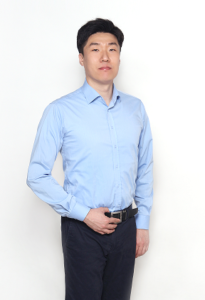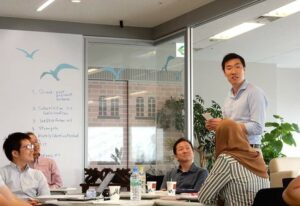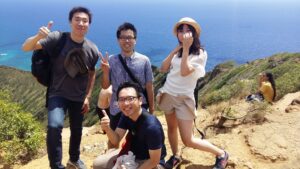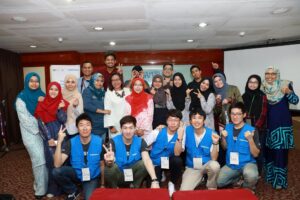Jihwan Woo
Fujitsu Scholar on the 2016 Fall Course
Manager at Shinhan Bank
Adjunct Professor at School of Management of Technology in Korea University
Pursuing A Better World with AI
Dr. Woo is an experienced AI expert in charge of developing digital transformation strategy for the financial industry. Prior to joining the current industry, he has worked more than 10 years in a research center for the consumer electronics industry as a staff engineer. His interests are not limited to technology areas such as computer vision and artificial intelligence, but also financial investment, management and innovation strategy of technology. He is also an adjunct professor in management of technology.
Social Issue Theme(s)
Career

| Apr 2020-Present | Manager, Shinhan Bank, AI Competency Center |
|---|---|
| Mar 2020-Present | Adjunct Professor, Korea University |
| Apr 2013-Mar 2014 | Visiting Scholar, Carnegie Mellon University, Robotics Institute |
| Sep 2010-Apr 2020 | Staff Engineer, Samsung Electronics, Samsung Research Center |
| Mar 2009-Mar 2010 | Business Consultant, Neoplux |
Awards
- Best Paper Award, Korea Productivity Association (2018)
- Participation Award, Korean Intelligent Robot Competition (2002)
Selected Publications
- “A Study on the Influence of the Governmentʼs Innovation Promotion Policy on the Innovation Performance of the Service Industry”, Journal of the Korea AcademiaIndustrial cooperation Society, Vol33 No.3, 2019
- “An Analysis of the Hampering Factors of Innovation: Focusing on SMEs in Korean Manufacturing Industry”, Journal of the Korea Academia-Industrial cooperation Society, Vol. 19 No.8, 2018
- “Bit Depth Expansion using Error Distribution”, Journal of broadcast engineering, Vol.22 No.1, 2017
- “Probabilistic matching of lines for their homography”, 16th IEEE International Conference on Image Processing
- “Probabilistic matching of line segments for their homography”, 2008 19th International Conference on Pattern Recognition
- “Vision-based UAV Navigation in Mountain Area”, IAPR Conference on Machine Vision Applications/IAPR(International Association for Pattern Recognition)
Selected Patents
- US9357117B2, “Photographing device for producing composite image and method using the same”
- JP6292867B2, “Imaging apparatus and method for photographing a composite image”
- US9304653B2, “Method and apparatus for creating 3d image based on user interaction”
- US9135711B2, “Video segmentation apparatus and method for controlling the same”
- EP2790405B1, “Three-dimensional image conversion apparatus for converting two-dimensional image into three-dimensional image and method for controlling the conversion apparatus”
- US20160127624A1, “Wearable device and control method thereof”
Capstone Project at JAIMS / Current Project(s)
Capstone project was conducted to create a company where employees can work happier. I carried out the Capstone Project with the belief that the company can be not only a place to make money, but a place to pursue happiness. While benchmarking a Japanese small and medium enterprise, Mirai Industries, I suggested a way to make a happy company.
Interview
A Pivotal Life-Altering Experience
Dr. Jihwan Woo completed the Global Leaders for Innovation and Knowledge program in the fall of 2016. Before the program, Dr. Woo had worked for 10 years as an engineer at a major Korean ICT manufacturer, experiencing firsthand the pressures of a stressful work environment. Inspired by this, his Capstone Project created during the program explored ways to improve happiness among employees. After returning to Korea, Dr. Woo not only changed his career but also his outlook on life, prioritizing the promotion of happiness among the team members he oversees as an AI researcher at Korea’s Shinhan Bank. He’s also taken the idea of knowledge-sharing to heart as an adjunct professor at Korea University, teaching about AI and the management of technology.
―What are your major takeaways from the program and how are they helping you now in your day-to-day life?
One major takeaway is the Japanese concept of “ba,” which refers to a place for generating wisdom or information. Before the COVID-19 pandemic, I tried to create such a space by making time to have tea with my team members on a regular basis. We would enjoy casual conversation but also share ideas about our work at the same time, and sometimes this helped us find good ways to resolve problems in our work.
Now that we do not get to meet in person, we have had to create a digital, online “ba.” This can be a challenge, as without physical contact, it’s very difficult to share our emotions, ideas or detailed knowledge with others. My way of doing this has been to use efficiency applications like Notion and Slack to promote communication among the team. Also, I use messaging apps to promote small talk, letting my team members know that “I’m not just your supervisor. I also care about you and want to be your mentor as well.” I truly want to help each team member reach their full potential.
Another related takeaway concerns how good ideas are generated. Before I participated in the program, I thought that only people with a certain degree of talent or knowledge were capable of formulating good ideas. Yet during the program, I learned about the SECI model and how information can be generated from the spiral process of its four components: socialization, externalization, combination, and internalization.
I’m now applying the SECI model to my work, such as when sharing my experience and specific knowledge about making computer programs with my team members. I’ll use Notion or Slack and other digital tools to share my findings, and this enables my staff to come up with good ideas. Subsequently, they also share their own ideas with other colleagues, so this is how we achieve knowledge sharing. Realizing that normal people like me can generate valuable ideas if we use the SECI model was a significant takeaway.
―How did your stance on being a leader change after completing the Global Leaders for Innovation and Knowledge program?
I used to believe that charisma or strong leadership was very important quality for a leader. Someone with strong leadership could push their subordinates, which would enable goals to be achieved easily. But I totally changed my mind. Thanks to the program, I realized it was more important to be a leader who can sympathize with others and be a good listener.

Sometimes a strong leader cannot win the minds of their subordinates. They might pretend to obey the leader and act like they are working hard, but they will not follow the leader with sincerity. Pretending to work hard is just a waste of company time and money, and a waste of the supervisor’s time as well. However, subordinates will easily follow a leader who listens carefully to what they say and sympathizes with what they are saying. Good motivation really makes for good work.
This is particularly important for leadership during and after the COVID-19 pandemic. The pandemic has changed so many aspects of our daily lives. We cannot have offline meetings as frequently as before the pandemic, so we have to make do with online meetings; yet in online meetings it’s very difficult to watch over others directly. Sympathetic leadership is important to help employees retain motivation in their work.
―How would you describe the Global Leaders for Innovation and Knowledge program in a single word?

I think it’s like a “Wonderwall” for me. That is a word not in a standard English dictionary; it’s the name of a song by the British rock band Oasis. Part of the lyrics in the chorus are “You’re gonna be the one that saves me” and that’s how I feel about the Global Leaders for Innovation and Knowledge program, since my life, and the way I looked at my life have changed for the better.

Before the Global Leaders for Innovation and Knowledge course, I just wanted to follow the money in my career decisions. As a very competitive person, I wanted to win, to get the best promotion, and earn a high salary. The program helped me rethink my priorities, take time to appreciate the simple, beautiful things in life like the sunsets in Hawaii, and even helped me find my wife (who had been studying in Tokyo), as we both connected when discussing the SECI model on our first date! The program was a really significant turning point in my life.
―What are your future goals?
I want to help engineers and other people at startups with investment because I believe I can evaluate the value of their intangible assets. I want to provide them with financial support to give them a higher probability of success.
Ultimately, I want to be a global investor. My goal is to invest in young, talented venture companies in Southeast Asia such as in Vietnam, Malaysia, and Indonesia – countries with large populations where parents push their children very hard to gain education. I really attribute this focus to my participation in the program, where I was able to gain an international perspective and interact with great leaders from many Asian countries.

To be an investor, I need to know understand more concepts regarding finance, and that’s why I moved to a career in the finance industry. Now I am enjoying the journey towards my career goals, and I regard teaching at a university as one part of my journey. In order to share my experience efficiently, I need to develop my ability to teach others, and that’s why I’m working at the university despite earning a very small salary. The end goal is really to teach others and share my knowledge and experience.
―Do you have any message to others interested in applying to the program?

My message to such people is “Don’t hesitate. Just keep an open mind and go with the flow.” I hesitated before submitting my application to the Global Leaders for Innovation and Knowledge program worrying that if I participated, I would disrupt my career and I would not be able to receive a salary for several months. I was afraid of what I might lose because of this program. Yet having experienced it, I now encourage people not to hesitate, to just try it and see where it takes you. You’ll enjoy this journey for three-and-a-half months and after the journey, you’ll become a better person, not only in your professional life but also in your personal life!
―Summaries
1.Summary of what was learned, changes in leadership
Anyone is capable of generating valuable ideas if we use the SECI model. Being a sympathetic leader that listens carefully to one’s staff is more important than being a charismatic or strong leader, as you’ll have a much better chance of motivating others and gaining their genuine cooperation.
2.Scenes or situations to apply what was learned on the program
Having “ba,” or a place for generating wisdom or information, is very important. Taking tea breaks with my team members helped serve this purpose before the COVID-19 pandemic, but now we try to keep up this practice through online conversations. Using digital tools like Notion and Slack have helped us implement the SECI model to share specific experience and knowledge among the team.
3.One-sentence summary of the Global Leaders for Innovation and Knowledge
The program was my personal “Wonderwall” because it completely saved me and helped me look at life in a new way.



